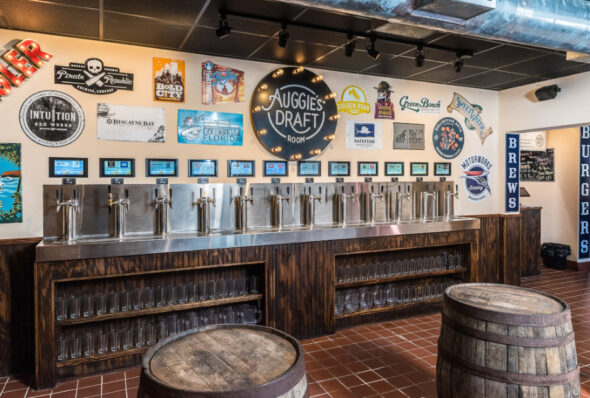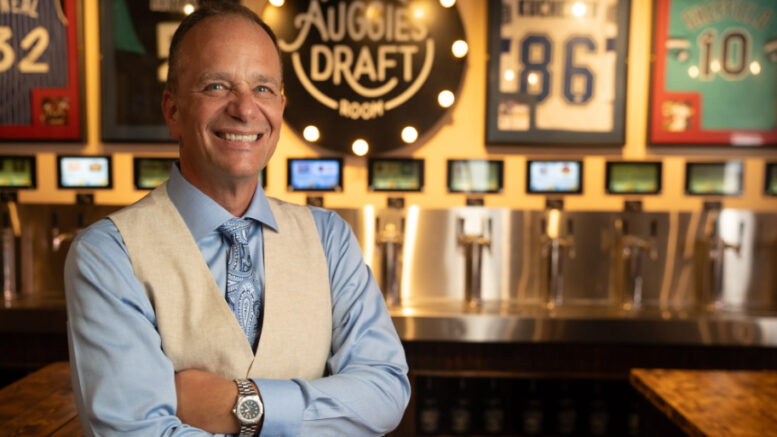By Olivia Lockett
ST. AUGUSTINE, FL—Success in the restaurant industry isn’t just about great food—it’s about knowing when to change course.
John Felico, former co-owner of Auggie’s Draft Room, and his daughter, Flagler alumna Rebecca Kernan, have spent decades opening, running and selling restaurants. Felico’s approach is rooted in flexibility, understanding customer behavior, and making strategic shifts.
“During our first six months owning Auggie’s, we only grossed $200,000. It was not good,” Felico said. “Fast forward to this past December, we grossed $300,000 just for the month. That was because of all the tweaks and changes I knew I had to make.”
Felico originally envisioned Auggie’s as a self-serve beer hall, but the concept alone wasn’t profitable. He credits the addition of a food menu as the key factor behind the establishment’s success.

That pivot transformed Auggie’s into a thriving quick-service restaurant, but Felico’s success wasn’t just about adding food—it was about understanding the market in St. Augustine.
“Most people think they’re opening a restaurant in a vacation town,” Felico said. “St. Augustine is not a vacation town. It’s a tourist town. There’s a fundamental difference.”
With most visitors stopping in town for just a few hours, efficiency became his priority.
“It’s not even a matter of serving the best food or the most unique menu,” Felico said. “It has to be good, hot, fresh, but it must be fast.”
Felico’s entrepreneurial spirit is deeply rooted in his upbringing. Having grown up in Brooklyn in a family of street vendors, he was always surrounded by the hustle and bustle of the food industry.
“My life became a steady diet of hot dogs and hustle,” Felico said.
After years of running successful restaurants, he found himself yearning for new challenges.
“I couldn’t retire,” Felico said. “It took one month, and I was literally filling out applications to drive Uber. That’s how bored I was. Anything to meet and talk to people.”
His passion for creating memorable dining experiences drives his approach to each new venture.
“I never look at a restaurant as just a place to sell great food,” Felico said. “I try to create an experience. That, to me, is much more important than the actual restaurant itself. The food is easy. I’ll adjust the food to the concept.”
Despite his success, Felico remains grounded and aware of the newly evolving landscape of the restaurant industry.
“Unlike most industries, the restaurant business changes at a snail’s pace,” he said. “But real change is happening now. In the next decade, your restaurant experience could look completely different.”
Your table might illuminate with personalized menu recommendations while a team of robots named Flippy prepares your meal with precision. Before you know it, your food arrives at your table, delivered by autonomous food runners.
“It may sound far-fetched, but it is already happening. Everything described is in use at restaurants across the country,” Felico said. “In fact, a local restaurant, Green Papaya, already employs food-running robots.”
Felico’s vision for the future of dining goes beyond just technology; it reflects a profound understanding of human behavior and market dynamics.
This is why Felico says he wrote his book, “Drafting a Dream,” to provide entrepreneurs with the knowledge they need to succeed.
“50% of all new restaurants fail in the first year,” Felico said. “On the surface, that is a terrible statistic, but numbers alone do not capture the devastation of a failing restaurant. People aren’t just losing a business. They’re losing their life savings, their dreams, and, in many cases, their stability. ‘Drafting a Dream’ was written to prepare people for this journey before they start.”
After finishing his book, Felico is eager to explore his next opportunity.
“Success isn’t just about what you achieve; it’s about the journey you take and the people you inspire along the way,” he says. “I’m not done yet—there’s always another adventure on the horizon.”




Be the first to comment on "The Art of the Pivot: How John Felico Thrives in the Restaurant Industry"